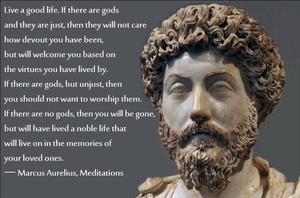It is difficult to write this little piece. My chest bursts with the desire to weep for sudden memory, uninvited shame, and long regret. Making myself write it, well, that is an exercise Aurelius would have demanded of me. So I will try to be a good Stoic. In his way.
I first read Aurelius in Gorsebrook School Elementary when the principal, Mr.Moser read a little journal which I put up on the blackboard each morning before school. That would be in Grade 6 and I was twelve.
Aurelius became my mentor – along with Moser and my parents. He lived almost two thousand years before me. Roman Emperor from 121 to 180 CE. I read about him in 1956 CE. I came across him in Gibbon’s Decline and Fall of the Roman Empire, a longish book, a dozen volumes or so, a Victorian staple, historical stuff, which Moser brought to school from his library for me to read. He set me up a tiny office, on the stage, but behind the curtains of the school assembly room. I could go there when I needed to.
Gibbons described Emperor Aurelius as the best man who ever lived. Moser endorsed that view. Aurelius’ wrote a book called The Meditations. The one I’m on about today. Later, reading the Meditations I had to agree, with those men, though I kept counsel that my father or even Mr. Stanfield (a friend and Premier of Nova Scotia) would and could surpass Aurelius. And there was Moser, too.
Now about The Meditations, written towards the end of Aurelius’ life and reign.
Aurelius introduced me to philosophy, and, in a short but tight discussion, taught me what good man should be. And while I have never wavered from philosophy nevertheless I have let him down badly. I became neither good nor even nice.
Aurelius writes as you might in a modern diary. His task is to explain what a good man is like, how he can make himself good, and, by the by, what it means to be a philosopher. What one is and what studying philosophy should do to you.
 His book has served, ever since, as an addendum to the Christian Bible (New Testament, King James) for the education of Brits and for those who must bear responsibility in society. It was a manual for the Great Game, for the great schools in Britain and for those who served both well and badly, in Great Britain and the British Empire. Boy Scouts were Aurelian Stoics, still are.
His book has served, ever since, as an addendum to the Christian Bible (New Testament, King James) for the education of Brits and for those who must bear responsibility in society. It was a manual for the Great Game, for the great schools in Britain and for those who served both well and badly, in Great Britain and the British Empire. Boy Scouts were Aurelian Stoics, still are.
Aurelius teaches one thing above all, self-discipline. His Meditations is the first self-improvement manual. It was written for men, of course, but I can’t think of anything which he would not apply to women. Educated people in Rome were advised never to underestimate women, not in anything.
You achieve self-discipline by a life long struggle against your bad emotions, and by cultivating your good emotions. The details are awesome. Self-discipline requires you to remain calm, never to hurt people unnecessarily, you must love your children and family (historians record that he had trouble with his son). He goes into every detail.
In addition to the morals he also taught psychology: how one should seek happiness. You achieve happiness by getting to the truth about life, facing it, and, admittedly, it’s not pretty. He sees life as endlessly difficult but it can be made manageable. And try to die quietly.
As I say, I failed quite miserably, first part and second. But I do have a last chance in the third.
Finally he conveys the philosophy of Stoicism. Something very near what we would call wisdom. All in one book. A good read, a good man, a splendid philosophy.

























Comments
Please login to post comments.